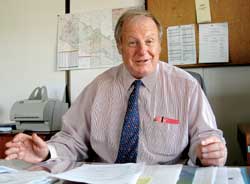Matthew Kahane has spent 33 years within the United Nations. The recently-appointed UN Resident Coordinator in Nepal talked to Nepali Times about how the world body could help broker peace in Nepal, oversee Bhutani refugee repatriation and restart development.
 Nepali Times: The UN has offered help to solve the crisis in Nepal, but the government says it doesn't need outside mediation. What can be done?
Nepali Times: The UN has offered help to solve the crisis in Nepal, but the government says it doesn't need outside mediation. What can be done?
Matthew Kahane: When the Nepali delegation led by Ambassador-at-large Bhek Bahadur Thapa met Secretary General Kofi Annan in New York, the latter welcomed intentions of the Nepali government to resolve the issue through discussion between Nepali parties. He repeated that the UN stood ready to help in any way.
Is there a concrete role for the UN?
Concrete steps in any such conflict tend to be very low key because confidence building is not an issue of a third party claiming a role for itself. Our programs, carried out at present under the general heading of peace and development, should be seen by civil society and all political actors as confidence building measures. When it comes to a role more specifically on political discussion, that is an issue that will have to wait a request from Nepal that involves all parties.
We have a Catch-22, then. For peace we need development, and for development we need peace.
I agree this is a very complex situation and I don't believe there is going to be one single simple solution that suddenly restores elected representatives at all levels, peace, security and goodwill. What I imagine is going to happen are a series of steps where the government increases the effectiveness of its institutions and initially, it will be some places more than others. People respected in the local community will be able to lead because of the confidence they inspire. One could broaden the area of civil discussion step by step and therefore of civic action that could lead to development work.
The Maoists want the UN to amplify their view that there should be no foreign intervention in Nepal.
My impression is that the Communist Party of Nepal (Maoist) has its own website to spread its views. The UN is normally not a sounding board or a mouthpiece of any political party in any conflict.
You just returned from a visit to western Nepal. How have UN programs been affected?
What struck me was that the continuity of each UN activity depended on the Maoists. Clearly, all of them, at some point, have run into questions by people identified as Maoists. Permission to continue was given when they understood that the programs are particularly aimed at the poor and most disadvantaged. We have not felt that our programs had to stop, but much effort has gone into explaining them.
What about the human rights situation?
There is a huge range of issues that I came face to face with over the last two or three days: issues like girls' access to schooling, which is a fundamental right. I see there is great opportunity for action by Nepali society with the support of the UN and others. With regard to civil conflict, whenever there is this crisis, one gets an increase in abuse and neglect of human rights by all parties. The UN acting high commissioner to human rights called on all parties to respect basic human rights-rights to life, liberty and physical well being. That is something where a great deal of education is needed but of course it is through the leadership of any armed group, whether it is the law enforcement agencies or the Maoists, that the basic principles of operations are respected.
Does the UN have a third party role between Nepal and Bhutan on refugee repatriation?
What I understand is that we have an agreement between Nepal and Bhutan on a bilateral basis to move forward with the return to Bhutan of most refugees in the camps where the verification was first carried out. Normally, when refugees are repatriated, there is some mechanism to help them on their return to verify conditions are met. The international community believes a third party could be helpful, but it depends on Nepal and Bhutan. Nepal has clearly said it would welcome the idea.
But Bhutan is opposed to it.
Indeed.
The UN is often criticised for being top-heavy, and generating enough paperwork to build a ladder to the moon.
And back (laughs). What obviously counts is the difference that one can make to the lives of individuals who are disadvantaged, deprived and are less well off. Reports that analyse situations are important, otherwise we go into things blind, deaf and make stupid mistakes. In many areas, you need to have a decent technical study of things. But, very often, I tend to think what is needed is to take what we know and get on with it rather than studying it again. You won't find me promoting new reports extensively. I believe reports need to be very simple, short and succinct. It is not the volume that counts, the quality of facts and analyses matters.


